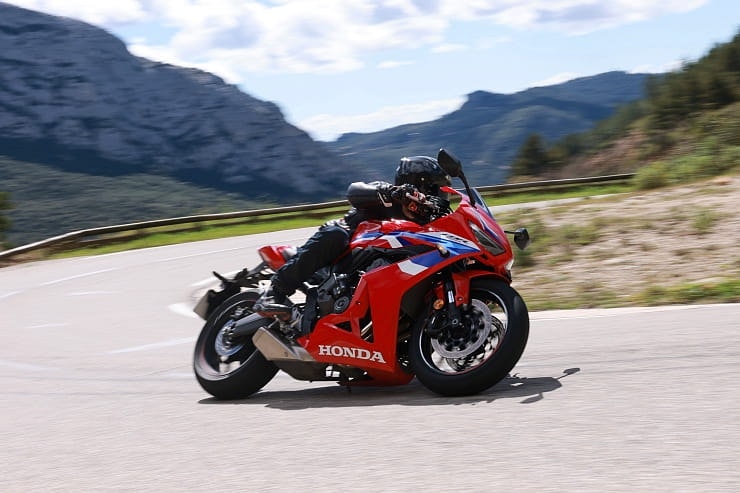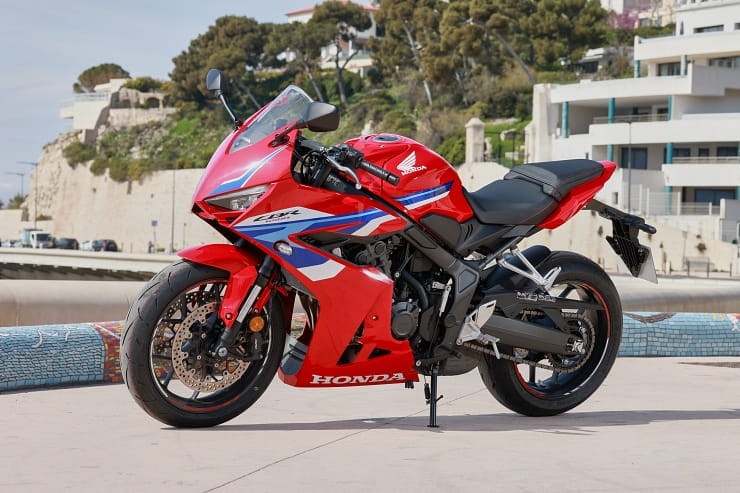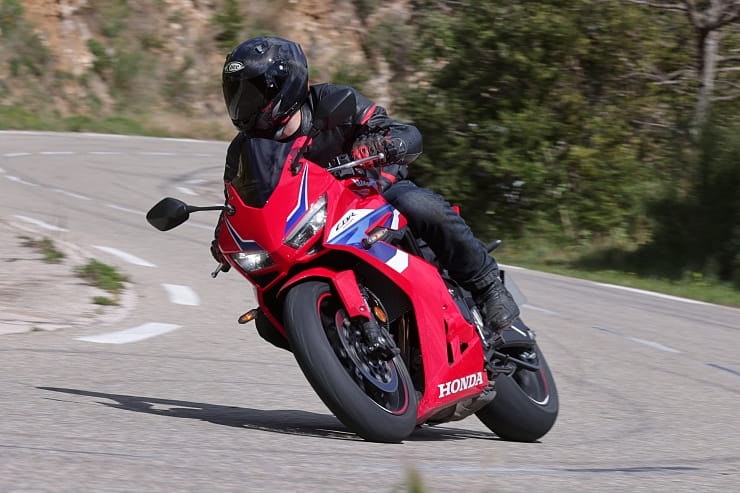Honda CBR650R (2024) - Review
Motorcycle Journalist and one half of Front End Chatter
05.04.2024
Technical review: Ben Purvis
Press launch review: Martin Fitz-Gibbons
£8,599 - £8,699
94bhp
209kg-211kg
4/5
Honda’s CBR650R might get pigeon-holed as little more than the friendly face of middleweight sportsbikes, doing so does it an enormous disservice. This is the biggest-selling sportsbike in Europe. So while the glitzy, race-developed CBR600RR and Fireblade SP might sparkle brighter and attract more breathy coos across UK showrooms this year, the modest 650 is virtually guaranteed to open more wallets. In fact, it’s likely it’ll outsell both its CBR stablemates combined.
For 2024 Honda haven’t messed with the formula behind its most popular CBR. The 650 gets a nose-to-tail restyle (alright, subtle, we grant you), a touch more tech, and is available with Honda’s all-new E-Clutch system. Don’t dismiss this as Honda’s automatic DCT setup under a different name, nor as a technology aimed strictly at helping newbie riders find their feet (and, err, left hands) in their early years. Just like the CBR650R itself, E-Clutch offers so much more than many riders will give it credit for.
Updated bodywork gives a more aggressive look
Optional E-Clutch is cheaper than a quickshifter
The only inline-four engine in the segment
E-Clutch downshift smoothness limited by lack of ride-by-wire
Ever-so-slightly abrupt fuelling from a closed throttle
Motor has a less flexible delivery than some rivals
2024 Honda CBR650R & CB650R Review
A nose-to-tail subtle restyle, a touch more tech, and the all-new E-Clutch system arrives on the 2024 CBR650R and CB650R, so Mufga goes to ride them both.
2024 Honda CBR650R Price
A standard CBR650R will cost £8599 on the road – an increase of just £100 over what the previous cost last year. However, the 2023 CBR650R is still listed on Honda’s UK website, now at a discounted price of £7999, which might sound like a bit of a bargain given the relatively mild updates made to the base model.
Things get much more innovative when it comes to the E-Clutch version, which surprisingly costs just £100 more at £8699. If you were expecting it to cost a lot more – something closer to the near-£1000 premium that DCT adds – then you’re not alone.
If you’re considering finance, Honda UK offer both PCP and HP schemes. On a typical PCP deal it starts with a deposit of £2017.34, then 36 monthly payments of just £99. After that, if you want to keep the bike there’s an optional payment of £4803.15. That’s based on riding 4000 miles per year, with interest working out to an APR of 9.9%.
On an old-school HP plan, a £2477.04 deposit leaves 36 monthly payments of £199. Again, the interest rate is 9.9% APR.
The 2024 CBR650R is available in two colours: a matt black and a gorgeous “Grand Prix” red. In person the red, with its HRC-esque blue and white flashes, looks so good you half expect Honda to charge a premium for it. But they haven’t – both colourschemes are the same price.
2024 Honda CBR650R Engine & Performance
For several years the CBR650R was the last remaining inline four middleweight sportsbike you could buy – an astonishing thought, given how the class was the backbone of British biking for so long. But that’s no longer the case, with both the CBR600RR and Kawasaki’s ZX-6R making simultaneous phoenix-from-the-flames comebacks in 2024.
It’s the same 649cc four we’ve known for nearly a decade now, stretching back through the 2019 CBR650R to the 2014 CBR650F. Peak power and torque figures are unchanged from last year, with 94bhp at 12,000rpm and 46lb·ft at 9500rpm. The good news is that neither figure has been affected by the 650 motor now being made Euro 5+ emissions compliant.
The only change Honda say they’ve made is a tweak to intake cam timing so miniscule you can barely see it even on Honda’s own charts (see carousel of images above). To our eyes, it appears to show the intake valves open and closing a hair later, the resulting bump in low-down torque so small Honda describe it as “improved torque feel” rather than a material, tangible improvement in actual usable grunt.
And that’s exactly how it feels on the road: no different from last year. Compared with a CBR600RR or ZX-6R it still has a grunty, flexible, undemanding power delivery, thanks to its relatively long-stroke dimensions and relatively low redline (around 12,500rpm) for a supersports motor. But compared with the latest generation of twins and triples – Suzuki GSX-8R, Triumph Daytona 660, Yamaha YZF-R7 and so on – it’s still the standout screamer of the bunch, a motor that gives back more the more a rider puts in.
So while the CBR650R will thrum about smoothly and politely below 8000rpm, it desperately wants to be revved above this to scurry along A-roads picking off quick overtakes. The only downside then is that there’s a patch of tingly high-frequency vibration that comes in as you head for five-figure revs.
And what about E-Clutch? On the CBR650R, which is likely to spend more of its time being ridden out of town than its mechanically identical naked CB650R version, the most useful part of E-Clutch is how it functions as a two-way quickshifter, giving extremely smooth and quick upshifts regardless of revs or throttle opening, as well as decent (if not perfect) clutchless downshifts. Still, given the CBR650R’s standard quickshifter is almost three times the price (£278 fitted) of E-Clutch and doesn’t offer any downshift function, it’s a clear win overall for the new system.
So, how does it work, and what else does it do? E-Clutch, as the name probably suggests, is simply an electronically operated clutch, driven by a pair of motors geared together inside an extended casing on the right side of the engine. The system is smart enough that the ECU can open and close the clutch all by itself whatever the situation – pulling away, coming to a stop, changing gear. However, Honda have ingeniously integrated a manual clutch lever too, found in the normal spot on the left handlebar. You don’t ever have to touch it if you don’t want to, but if you do it’ll instantly override whatever E-Clutch is doing. It’s a great compromise: you can let it run in auto mode the bulk of the time, then step in when you want the finest level of predictable control (for slow-speed control, say), or even switch the whole system off in the bike’s settings if, for some inexplicable reason, that takes your fancy.
Crucially, what E-Clutch doesn’t do is change gear for you. The six-speed gearbox is completely manual, so you still have to swap between ratios using the conventional pedal by your left foot. Come to a stop in a high gear (say, 4th) and the dash will flash a small warning at you, but it’s still your responsibility to click down through the box to find first yourself. Exactly the same as you would if you came to a stop in 4th with a conventional transmission.
Around town it’s a welcome novelty to not reach out your left fingers as you slow for another red light, though it takes a bit of thought to reprogramme years (cough, decades) of riding habit and learned muscle memory. In sportier out-of-town riding, E-Clutch upshifts feel excellent – quicker and smoother than a quickshifter alone. The CBR still alters its fuel and spark timing when you put pressure on the gear pedal, creating a slight pause in engine momentum to let the next gear slot in. Where E-Clutch helps is by also briefly disengaging the clutch while this is going on, reducing what Honda calls “shift shock” and cutting the wait before drive is reinstated by a claimed 20%.
When it comes to downshifts, E-Clutch is good rather than great. The CBR’s cable-operated throttle means it’s unable to blip the throttle to help match revs between gear changes, unlike a ride-by-wire system. Instead you’re left with E-Clutch opening the clutch, letting the lower gear slot in, then re-engaging the clutch. As a result, the process doesn’t quite feel on the same level of refinement as the very best auto-blipping two-way quickshifters.
2024 Honda CBR650R Handling & Suspension (inc. Weight & Brakes)
The main frame is the same steel twin-spar item that the model has had for years, with unchanged stiffness and geometry. The rear subframe has been shaved down a whisker, removing 424g of weight. Up front there’s still a set of unadjustable 41mm Showa Separate Function Forks, only now with a slightly softer spring rate and firmer compression damping. At the back there’s a Pro-Link monoshock with a 10-step preload adjuster, connected to a smart-looking cast aluminium swingarm.
Wheels and tyres are the same size as before, but now wear updated Dunlop Roadsport 2 tyres with a different tread pattern and compound. Brakes are unchanged too, using a pair of 310mm discs and four-piston Nissin calipers at the front end.
Kerb weight has crept up a single kilo from 2023. It now stands at 209kg for the manual bike, and 211kg with E-Clutch. Not that it makes any perceptible difference in use – the CBR650R still steers with a calm, measured confidence at all speeds, rather than with a ravenous, frantic frenzied desire to fall straight on its ear like more track-focused machinery. There’s a great sense of connection to the road from both ends of the bike, in thanks to decent rubber and suspension that performs way better than you could expect ‘budget’ components to. Ride quality on bumpier roads is impressive, turn-in rate is consistent and predictable, and there’s absolutely no threat of a bar waggle. It might not be as knife-edge sharp as a “pure” supersports setup, but it’s much more compliant, far easier to get on with and still enormous fun to hustle along a twisty road.
2024 Honda CBR650R Comfort & Economy
Comfort levels are identical to the ’23 CBR650R, with the same riding position that remains part sports, part sports-tourer. It’s more relaxed and upright than Yamaha’s wrist-heavy R7, but more aggressive than Kawasaki’s Ninja 650. Compared to the naked CB650R, the CBR has an identical seat height (810mm) and footpeg position, the only difference coming from its clip-on handlebars.
That said, there is one ergonomic quirk that’s perhaps worth mentioning. The E-Clutch system adds some bulk to the right side of the engine case, but when riding the CB650R it’s not noticeable at all. But on the CBR, when putting my feet down at a stop I found my right knee brushing up against the back of the E-Clutch unit. Hard to explain given the riding position similarities between the two bikes – I can only put it down to me sitting more forwards on the CBR’s seat, perhaps due to the clip-ons being set further away.
Fuel tank volume is the same 15.4 litres too, with the same 3 litre reserve, and the same claimed fuel economy of 57.6mpg. Crunch the numbers and that suggests a useable range of 150-160 miles, with a maximum distance of 195 miles to dry. Unfortunately we didn’t have a chance to measure fuel economy at the launch.
2024 Honda CBR650R Equipment
The biggest equipment update, with the exception of the optional E-Clutch, is the new full-colour TFT dash, a 5-inch unit using optically-bonded glass that minimises glare. Like the 2024 CB650R that shares the same upgrade, the CBR650R’s dash has three visual modes – ‘Bar’, ‘Circle’ and ‘Simple’ – and is smartphone-compatible. Download Honda’s RoadSync app to either Android or iPhone and you can connect to the bike’s display via Bluetooth, allowing control of music, calls and on-dash, turn-by-turn navigation.
To keep up with modern tech, there’s now a USB-C socket under the seat, too.
Honda is offering two distinct options packs. The ‘Racing Pack’ (£430) adds a quickshifter if you haven’t already specified the E-Clutch, as well as a colour-matched pillion seat cover and carbon-look tank pad, plus an oil level gauge and CBR-branded tank side pads.
The ‘Comfort Pack’ (£450) includes heated grips and luggage in the form of a 3-litre tank bag and a 15-litre tailpack.
2024 Honda CBR650R Rivals
Honda’s CBR650R might be Europe’s biggest-selling sportsbike in 2023 and 2021, but will it manage it again in 2024? It’s looking tougher than ever given the recent avalanche of affordable, versatile fully faired middleweights. The most obvious rival is surely Triumph’s Daytona 660, which offers a similar price, size and riding position, but a more flexible power delivery from its three-cylinder engine. You’d have to put Suzuki’s new-for-2024 GSX-8R in the mix too, especially given it comes with a slick two-way quickshifter as standard. Meanwhile, Yamaha’s R7 offers a completely different take on the class, with a far sportier, wrist-heavy stance, adjustable suspension, less tech and a less-powerful (but gruntier) motor. The right bike for you depends how sporty you want your middleweight sportsbike to be.
Yamaha R7 | Price: £8,910
72.4bhp / 49.4lb-ft
188kg
Triumph Daytona 660 | Price: £8599
94bhp / 51lb-ft
201kg
Suzuki GSX-8R | Price: £8899
82bhp / 58lb-ft
205kg
2024 Honda CBR650R Verdict
Given the CBR650R is already Europe’s most popular sportsbike, it’s impossible to see anything in this 2024 update changing that. Leaving E-Clutch aside for a second, the core bike itself gains a smarter-looking fairing and a far more modern colour TFT dash, but otherwise Honda haven’t messed with a recipe that’s proven so successful.
What might change things is the increased choice and variety of rival middleweight sportsbikes – both directly comparable machines like Triumph’s Daytona 660 and Suzuki’s GSX-8R, as well as racier options like Honda’s CBR600RR and Kawasaki ZX-6R – all of which will surely end up stealing some sales from the trusty, well-established CBR.
Will the addition of the E-Clutch system do anything to avert that? It’s a fascinating, innovative and effective system, but it’s also hard to imagine it offers a substantial enough difference to drag a sportsbike customer away from a rival that they had their heart set on. That said, given the E-Clutch model is just £100 more than the standard CBR – and when an up-only quickshifter costs £278 fitted – it’s an absolute bargain given the added refinement and functionality it brings.
E-Clutch will doubtlessly spread to other bikes in Honda’s range, and on the basis of this first taste of it, that’s something to be welcomed with open arms – especially if it only adds a similarly small amount of cost and weight. Our main hope is that its next move will be to a bike with a full ride-by-wire throttle, allowing Honda to add more refinement and sophistication to an already-impressive system.
If you’d like to chat about this article or anything else biking related, join us and thousands of other riders at the Bennetts BikeSocial Facebook page.
2024 Honda CBR650R - Technical Specification
Looking for motorcycle insurance? Get a quote for this motorbike with Bennetts bike insurance
What is MCIA Secured?
MCIA Secured gives bike buyers the chance to see just how much work a manufacturer has put into making their new investment as resistant to theft as possible.
As we all know, the more security you use, the less chance there is of your bike being stolen. In fact, based on research by Bennetts, using a disc lock makes your machine three times less likely to be stolen, while heavy duty kit can make it less likely to be stolen than a car. For reviews of the best security products, click here.
MCIA Secured gives motorcycles a rating out of five stars (three stars for bikes of 125cc or less), based on the following being fitted to a new bike as standard:
A steering lock that meets the UNECE 62 standard
An ignition immobiliser system
A vehicle marking system
An alarm system
A vehicle tracking system with subscription
The higher the star rating, the better the security, so always ask your dealer what rating your bike has and compare it to other machines on your shortlist.


